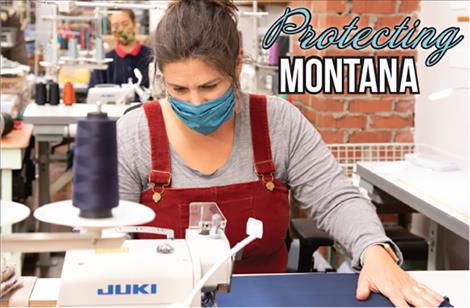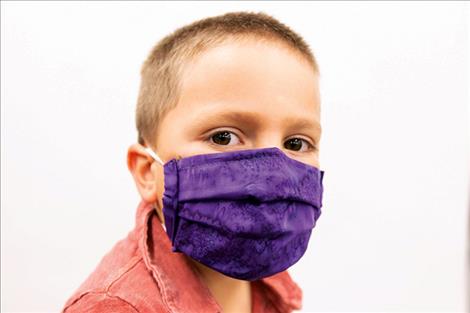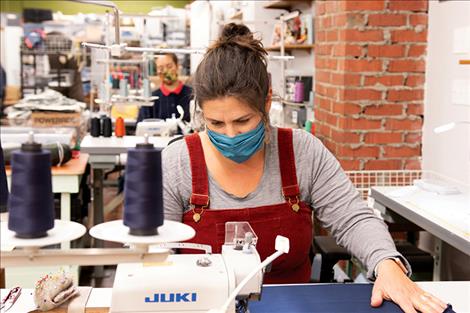Small Polson business gets statewide attention
Hey savvy news reader! Thanks for choosing local.
You are now reading
1 of 3 free articles.
POLSON – REcreate Designs is among six Montana businesses commissioned to create “Montana Aware” masks as part of the state’s efforts to promote safe fall and winter travel.
Creating 5,000 masks for the contract is almost second nature to business owner CarolLynn Lapotka. After all, she’s been at it for more than six months. Back in mid-March, Lapotka was showing her line of clothing, REcreate Designs, to wholesale buyers at the annual Made in Montana Trade Show in Helena when the next day’s public show was abruptly canceled due to coronavirus concerns.
Back home, a friend of hers, who’s a nurse, called with an urgent request: “Can you make something for us? We really need to protect ourselves.”
Lapotka, whose entire career is built on creativity and problem solving, went to work designing masks. She looked at patterns online, then starting modifying and testing them on her husband, assistant Lake County Attorney James Lapotka, and her two children. The face wear had to be comfortable, breathable and – for frontline personnel especially – needed to include an interior pocket for tucking in an N95 filter.
Once she had a design, she put out a request for donations of cotton fabric via her social networks, and placed a bin outside her handMADE Montana shop and design studio on Main Street in Polson.
Within an hour, a bagful of fabric appeared, and donations kept pouring in. People also gave money to the All in Stitches quilt shop next door to purchase fabric for masks.
Meanwhile, she developed mask kits for home sewers that included rectangles of pre-cut, edged fabric, elastic and plastic ties to hold masks in place over the nose. She created a YouTube video tutorial and a handout describing the process.
In addition to local volunteers, she sent kits to artists in Kalispell, Missoula and Helena who sew, so they could distribute masks in their communities. “Quilt guilds jumped on it too,” she said.
“Some people did 20, some people did thousands,” she adds. “We all had that mentality: ‘I want to be able to help.’”
Over the next month, Lapotka processed enough materials to make around 10,000 masks. At the same time, she created an order form on her website, handmademontana.com, so nonprofit businesses and organizations could order free masks. Local recipients included nursing homes and Flathead Reservation Community Action.
By April, she had added masks to her own online inventory, and when her store reopened this summer, masks were on the shelf. Mask-making, it turns out, not only served frontline workers in the early days of the pandemic, it’s since become a valuable revenue source, helping keep her own small business afloat during the economic downturn.
Last month, for example, she filled orders for 1,000 masks, which translates to $10,000 in income. This recent order for 5,000 masks from the Department of Commerce is another welcome infusion, helping her keep her four part-time employees busy and offering a new way to market her wares to a fresh audience.
“I haven’t moved my regular collection forward this year. That’s hard, but I made a choice on being able to keep my employees employed,” she said. Making masks “is security for now.”
Her process takes full advantage of sophisticated cutting tools and industrial sewing machines. Last week, her large cutting tables were covered in stacks of lightweight navy blue fabric, ordered from a mill in Missouri. The crew rolls the fabric out in layers and slices up to 2,500 rectangles a day. Next, they bind the edges at a pace of about 200 an hour.
Once the fabric is prepped, they add a pocket for a filter, bendable nosepieces and pleats, and then stitch on colorful side strips to hold the elastic in place. This final phase takes anywhere from three-to-five minutes. She tagged the order with her company’s logo and the Made in Montana logo.
“These 5,000 masks go to people we might not usually reach,” said Lapotka. “It’s a promotional way to reach additional people and tell our story.”
The 25,000 Montana Aware masks will be distributed to Montana’s 19 Convention and Visitors Bureaus and six tourism regions, who will disperse them to tourists during the late fall and winter months.
“Made in Montana companies across the state have stepped up during the pandemic to provide goods and services to keep people healthy and safe,” said Commerce Director Tara Rice. “This partnership is an opportunity to support local small businesses, promote the important Montana Aware message to visitors and continue to encourage responsible public health practices.”
This is not the first time Coronavirus Relief Funds dispersed by the state of Montana have helped Lapotka’s business. She used grant funds to update her sewing and cutting equipment, while an adaptability grant helped an employee work from home by furnishing her with a sewing machine. She also took out a loan from the Business Assistance Program to make sure her expenses are covered through the end of the year.
Lapotka adds that a Polson Rotary initiative that gave $250 in Polson Chamber Bucks to each school district teacher and staff member has found its way into the local economy. “Now those bucks are coming into our little shop,” she says. “It’s a meaningful drop of money into the local economy.”
Lapotka is a big believer in the value of supporting local businesses. In that vein, she re-launched a downtown First Friday event on Oct. 3, with masks and social-distancing guidelines. She’s also hopeful that locals support Shop Small Saturday two days after Thanksgiving.
“The whole small community thing – I think it can thrive, or it can die really fast when things have to get shut down,” she says.
Despite the pandemic, her own retail business, handMADE Montana, did well this summer, which in turn helps support the 80 or so artists whose work she sells. On the other hand, she had to cancel her four annual MADE fairs, held in Missoula, Bozeman and Helena. The popular events typically attract up to 8,000 buyers each and showcase works by more than 200 Montana artisans. “It wasn’t feasible. It wasn’t safe. And it wasn’t responsible of us to gather that many people in one place,” she said.
The artists who benefitted from her shows have lost a way to directly connect with customers. To help compensate, she’s beefed up the artist profiles on her website and notes that artists are adapting to the new COVID-19 paradigm by making more virtual connections with customers. But when it comes to art, virtual connections just go so far, Lapotka said. “When people buy handcrafted items from an artist, they’re buying a story not just a thing.”


















